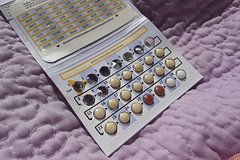One unpleasant side effect of hormonal contraceptives explained

Photo: Francesco Carta fotografo/Getty Images
Hormonal contraceptives provide a high level of protection against unwanted pregnancy and are often prescribed by doctors to solve various gynecological problems, but many women experience a decrease in libido when taking them, warned sexologist and director of the Secrets family and sexual education center Milana Sokolova. She told Lenta.ru about the reasons for this unpleasant side effect.
Sokolova explained that most hormonal contraceptives contain synthetic analogues of female sex hormones - estrogen and progestin, which prevent ovulation and, therefore, pregnancy. However, according to her, the drugs interfere with the complex hormonal regulation of the body, which can affect the level of sexual desire.
Libido is regulated by many factors, including hormones, psychological state, relationship with partner and overall physical health. Hormonal contraceptives can affect several of these factors, leading to decreased sex drive.
Milana Sokolova sexologist
Another reason for the decrease in libido, Sokolova said, is the decrease in the level of free testosterone in the blood, which plays an important role in the development of sexual desire in women.
In addition, the synthetic hormones in contraceptives can disrupt the body's natural balance of estrogen and progesterone, the sexologist continued. "Some women may experience a decrease in libido due to the suppression of natural fluctuations in these hormones, which usually contribute to the emergence of desire on certain days of the cycle," she explained.
Finally, hormonal changes can cause side effects such as weight gain, mood changes, anxiety, and depression, Sokolova says. These conditions themselves can reduce interest in sexual activity.
Earlier, Sokolova said that walking helps maintain libido in old age. In her opinion, swimming and yoga have the same effect.
lenta






